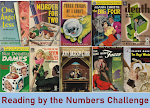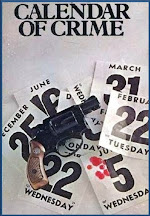The Owl in the Cellar (1945) by Margaret Scherf
Charlie Murphy is a young man with all kinds of troubles. He's home for a vacation, but his dreams of time to do whatever he wants whenever he wants die quickly. His mother is trying to set him up with a young woman who gives him a pain in the neck. Another young woman is dogging his footsteps wherever he goes. And the gangly, overall-wearing young woman next door keeps dragging him into murders. Well, not exactly. Charlie comes home late one evening to a mother who wants to know where he's been and who he's been with (and how on earth are you going to be awake enough to go play golf with Constance [the pain-giver] tomorrow?). Oh, and by the way, would he take care of the exotic bird in cellar before he goes to bed? Huh?
But Charlie, ever the dutiful son, goes down and finds an ordinary owl. He opens the cellar window and tries to encourage the bird to fly away. The owl has other ideas. He's taken a fancy to Charlie and refuses to go. So, Charlie leaves the owl and the open window and toddles off to bed. Later, he hears a noise and goes to investigate. The owl is still there...and so is a dead man dangling from the open window. When the police arrive in the person of Lieutenant Ryan, a wheelbarrow track leads directly to the house next door and blood is found on the Regents' wheelbarrow. The bodies start piling up and it begins to look pretty bad for someone in the Regent household. Charlie has developed a soft spot for Blue Regent (is that a name or what?) and plays hero, apparent accomplice, and amateur detective all at once. But is it possible his lady love is a killer after all?
As with most of the Margaret Scherf mysteries I've read, this one is great fun and a little off-the-wall. Charlie's mother is bigger-than-life Irish and the most meddlesome woman ever. If I were Charlie, I'd be moving out pronto. Of course, he's got bigger troubles than "Mayme" (as he calls her)--what with trying to dispose of guns and a second murdered man and Lt. Ryan implying that he might get locked up at any minute. But Charlie and Blue come through in the end and help Ryan nab the culprit. I had a sneaking suspicion "who" that was--but I didn't realize who the "who" was. (I promise that makes sense when you read the story...). Lots of frantic to-ing and fro-ing by Charlie and Blue and Daffy (Blue's sister) as well as others. Lots of bullets flying (though few hitting anything vital). Lots of clues and red-herrings and action. Just plain lots of fun. ★★★★
First line: "There's a bird in the cellar, Charles."
There was nothing of the silent, enigmatic sleuth about Ryan. He did all of his thinking out loud, and for him out loud meant halfway across the harbor.
Last line: Audrey is the worst sister anybody ever had.
******************
Deaths = 5 (one stabbed; three shot; one natural)













.jpg)

.jpg)
.jpg)




.jpg)






















